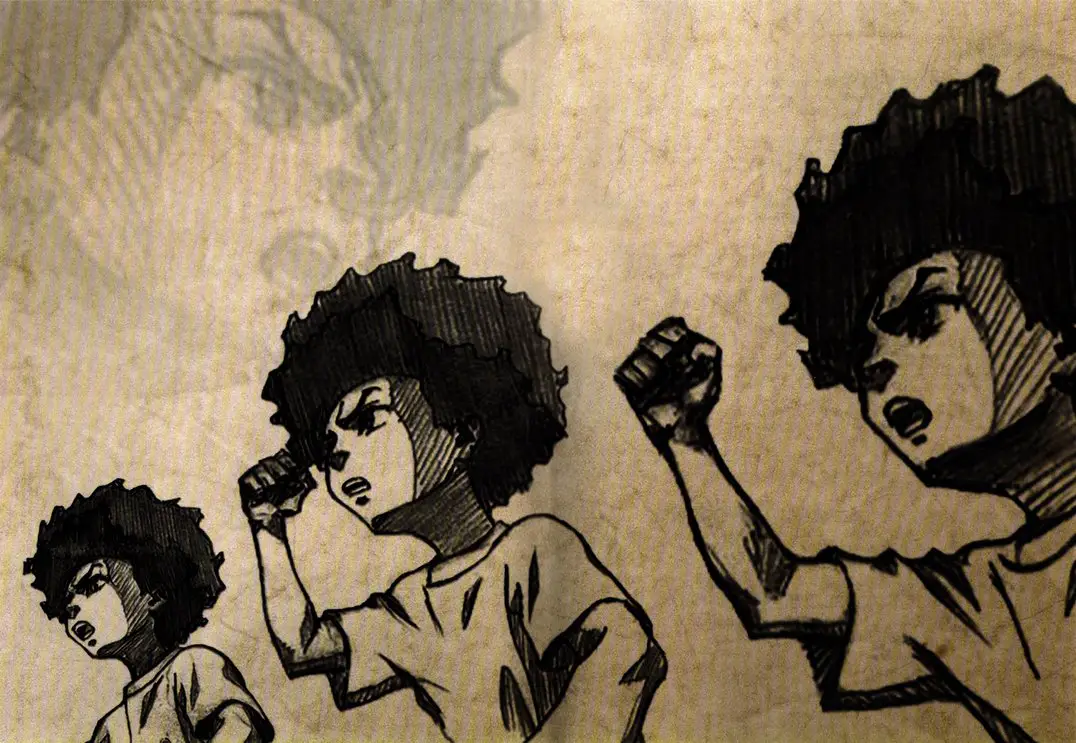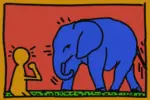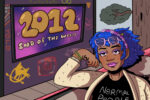“The Boondocks” is an animated television show that aired on Adult Swim from 2005 to 2014. Created by Aaron McGruder, the show tackled black issues from a critical black perspective. Beginning as a comic strip, characters Huey, Riley and Robert “Granddad” Freeman have been a vehicle for McGruder’s social commentary since 1996. The subjects he examined at the turn of the century are still as relevant now as they were back then, and viewers still have a lot to gain by watching the show today.
In the series, the Freeman family has just moved from the southside of Chicago to the predominantly white suburban neighborhood of Woodcrest in Baltimore, Maryland. There, they meet Uncle Ruckus (no relation), a black man who hates black people, and Tom DuBois, a mild-mannered black defense attorney who has a white wife and mixed daughter. Each character in the show has an important narrative role, and each character’s opinion often contradicts the others.
Huey Freeman, a 10-year-old radical activist, is the protagonist of the show. He is the voice of reason in many situations, especially when his younger brother, Riley, is up to no good. Deemed a “domestic terrorist,” Huey is influenced by various left-wing social justice groups. He is critical of his culture, especially of “gangsta” rap and BET, but he doesn’t hate his people. He simply wants better for them, and he hopes that they want better for themselves.
Riley Freeman is an impressionable 8-year-old boy who embraces the stereotypical “gangsta” lifestyle, often engaging in crime because he thinks it’s cool. He and Huey often disagree on different issues in the media, but instead of McGruder portraying one point of view as more correct than the other, he allows each character to say their piece and lets the audience come to their own conclusions.
For example, in “The Trial of Robert Kelly,” McGruder creates a trial based on the real-life R. Kelly allegations of 2002, which accused him urinating on an underage girl. Riley stands up for R. Kelly and insists that the girl was old enough to consciously get out of the way; plus, Riley doesn’t want R. Kelly’s potential imprisonment to interfere with his new album coming out. Huey believes that the rapper should be held accountable for his actions, and that his fame should not protect him from the law.
Huey exclaims to the courtroom, “Every famous n—- that gets arrested is not Nelson Mandela! Yes, the government conspires to put a lot of innocent black men in jail on fallacious charges. But R. Kelly is not one of those men!” After a brief pause, Riley boos and the courtroom, continuing to celebrate the rapper’s music, releases R. Kelly as an innocent man. In a reflective voiceover, Huey said that he battled ignorance that day, and ignorance won. “You do what you can to help black folks, and they make you wonder why you even bother,” he says. “But they’re our people, and we got to love them regardless.”
The topics that “The Boondocks” addresses are heavily rooted in the time period that it was created. To put this show into context, in 2005, George Bush was just inaugurated into his second term as president. YouTube was still in its infancy, and texting was still a cumbersome activity. Hurricane Katrina had ravaged the shores of New Orleans, leaving many African Americans homeless. The murder of Trayvon Martin wouldn’t be for another seven years, and Black Lives Matter would come a year after that. Even though McGruder’s style is commenting on current events, and those specific events are long dated, the concepts of each episode stand out because they can be applied to what we see every day in the news.
Another show like “The Boondocks” probably wouldn’t fly in today’s culture. It was vulgar, often deemed as the “N-word show” because of their frequent use of the “N-word,” and it sometimes did not tackle sensitive issues with the most finesse. For example, in “A Date with the Health Inspector,” the Freemans’ neighbor Tom is wrongfully accused of murder because he fit the description of the murderer (i.e. they’re both black). There’s a heightened sense of urgency for Huey and Riley to find the real murderer because Tom is deathly afraid of being anally raped in prison. Yikes.
While this episode does make important points about the penal system often working against African Americans, the anal rape bit can come across in poor taste today. I just wrote about how dark comedy can be a way to open dialogues about difficult matters, but I think that some of McGruder’s jokes sometimes push their limits. Again, I think we need to consider the social climate and what was considered acceptable in the early 2000s, and for all the good that McGruder did with his show, I think his intentions were always in the right place.
And to be fair, it’s not like McGruder has ever done anything without controversy. In 1999, his comic strip was accused of perpetuating harmful stereotypes. Two episodes of “The Boondocks” were pulled by Cartoon Network, most likely because McGruder harshly criticized some BET executives by name. He’s not afraid to say how he feels about topics important to him, no matter the consequences.
“What has never been lost on me is the enormous responsibility that came with ‘The Boondocks’ — particularly the television show and its relatively young audience,” said McGruder. “It was important to offend, but equally important to offend for the right reasons. For three seasons I personally navigated this show through the minefields of controversy. It was not perfect. And it definitely was not quick. But it was always done with a keen sense of duty, history, culture and love. Anything less would have been unacceptable.”
If you have time during your winter break, I highly encourage you to watch “The Boondocks,” which is available to stream on Hulu. However, I must advise you to stop after the first three seasons and ignore the fourth season, because McGruder voluntarily left the show to work on “Black Jesus.” Adult Swim decided to continue without him, thus producing a bastardization that lacked both intelligent commentary and finesse in its characters. It happens to the best of shows — corporate greed gets in the way of respecting a creator’s vision. C’est la vie.
Nonetheless, the first three seasons of “The Boondocks” are still an important piece of media that many people can benefit from watching. It is a blunt observation of race relations of a decade ago, and upon watching it now, the viewer is forced to realized that we haven’t evolved much. The same issues McGruder wrote about are the same ones we read about on Twitter, and we should all take some time to laugh and learn alongside the Freeman family.
















